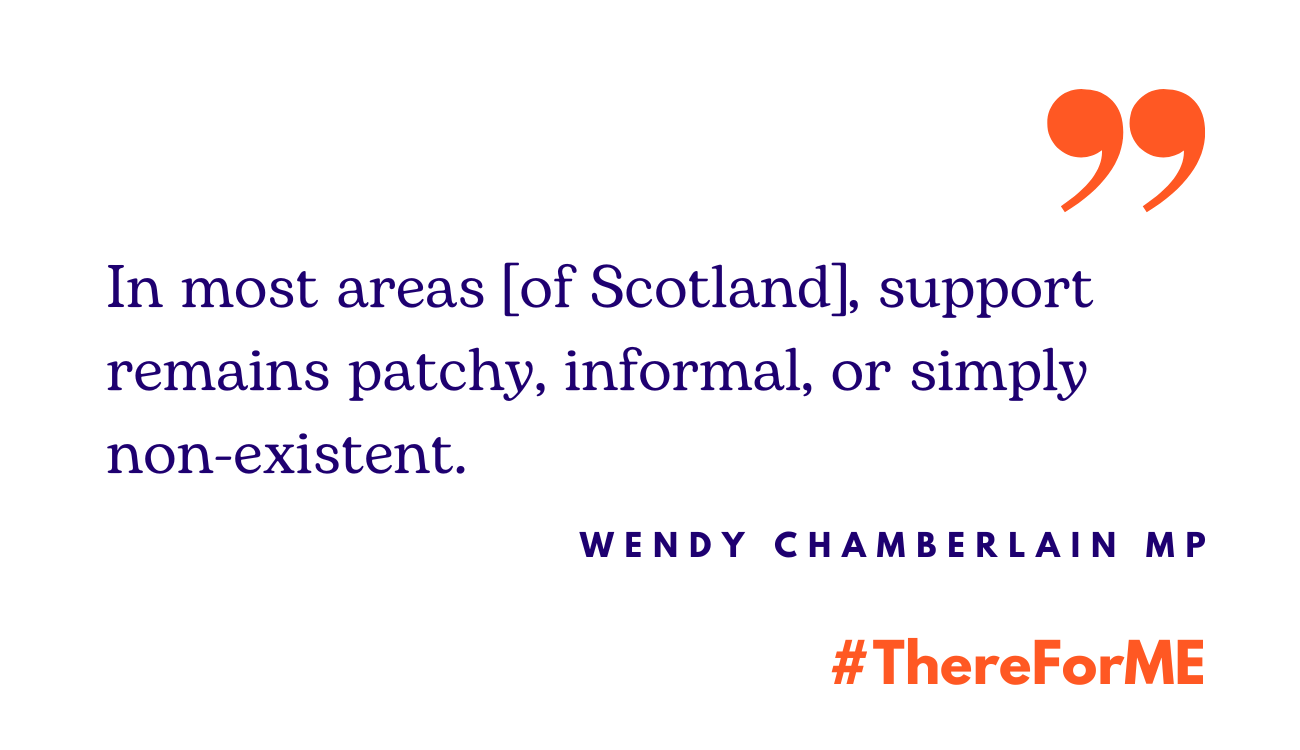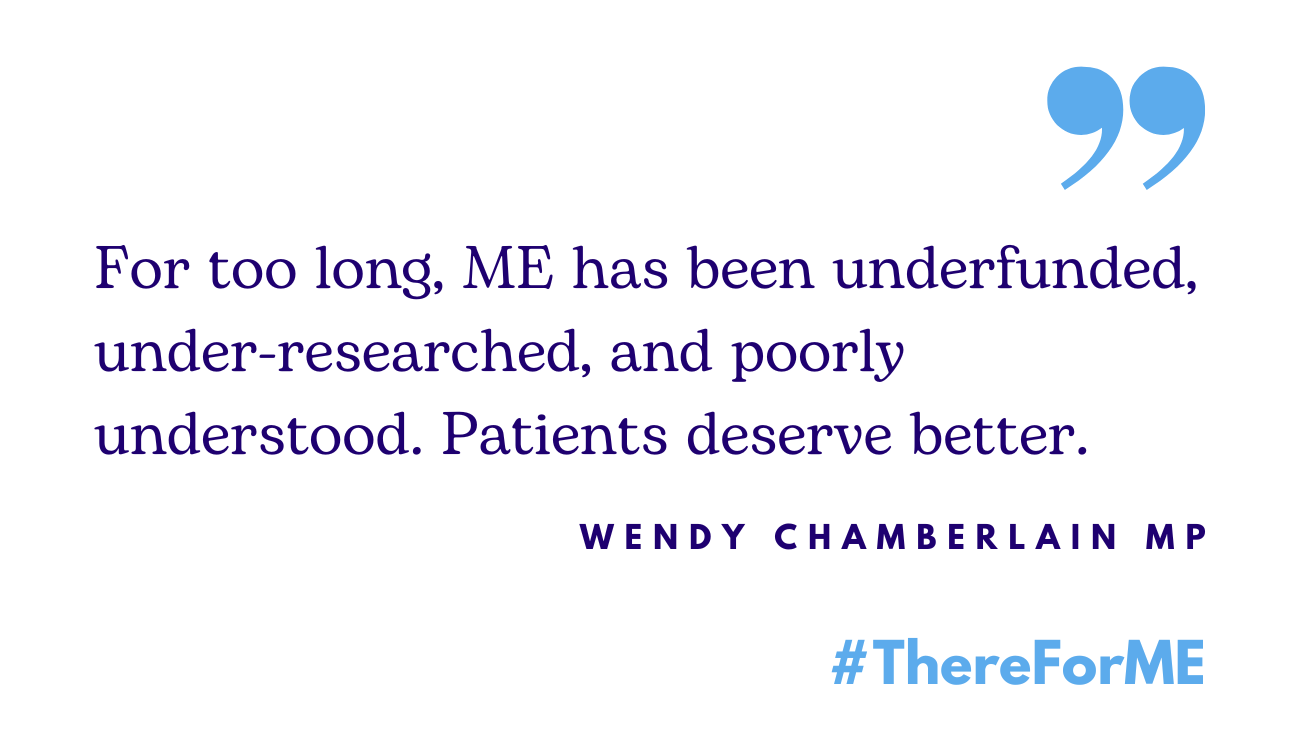Scotland must step up on ME care and research
An opinion piece from Wendy Chamberlain MP
Today’s guest post is from Wendy Chamberlain, the Liberal Democrat MP for North East Fife. Wendy featured in our 2024 #ThereForME advent calendar and is a long-term supporter of people with ME in Parliament.
ME has sat in the shadows of our healthcare system for decades. It is debilitating, poorly understood, and too often dismissed. People living with ME face long waits for diagnosis, a lack of specialist services, and uncertainty about how and where they can access support.
After years of tireless work from campaigners, the UK government has finally published a Delivery Plan for ME. It aims to boost research, improve education, and address failures in the health system. These goals are welcome, but the plan lacks dedicated funding and clear leadership – we still do not know who will have oversight of implementing this plan. Without new investment and clear targets, the plan risks being little more than warm words. I have been pushing the government to ensure that we see real action.
More disappointingly, for my constituents in North East Fife, the Scottish government has shown no inclination to publish a Scottish equivalent to the plan. Instead, ministers say they are engaging with health boards to raise awareness of existing guidance, and that funding for ME and Long Covid will be channelled through NHS budgets. I was pleased to see that the Scottish Government committed £4.5 million annually to Long Covid, ME and other similar conditions, which was clarified in a Parliamentary Question asked by my colleague, and leader of the Scottish Liberal Democrats, Alex Cole-Hamilton. However, I share the frustration of organisations such as Long Covid Scotland and Long Covid Kids over long delays in allocating these funds to services.
Challenges in Scotland and North East Fife
A lack of ownership from the Scottish government has resulted in the disparity and service failures that my constituents have come to know all too well following the passing of Keith Anderson two years ago. He was the sole specialist nurse in Scotland, and his clinic offered dedicated support for people with ME across the region. At the time of his passing, NHS Fife pledged to recruit a new specialist nurse but have so far been unsuccessful. The inability to recruit and fill this role has left my constituents with nowhere to turn. Indeed, there are currently no specialist doctors and nurses across the whole of Scotland. It has shone a light on existing services and, in particular, the gaps in them, highlighting long wait times, stretched resources and funding challenges.
Despite not being able to fill this role, NHS Fife has responded positively to the idea of digital platforms for remote care. This is particularly important for those with severe ME who are housebound and cannot easily attend appointments. These steps matter, but progress is slow, and for many patients in Fife, meaningful access to specialist care remains out of reach. I am calling for the Scottish government to urgently roll out its Digital Front Door pathway and will continue to hold ministers to account in this regard.
However, the picture across Scotland is uneven – a recent health board survey showed that only NHS Fife and NHS Lothian ever offered a specialist pathway for ME patients, and as of 2023, only NHS Lothian’s pathway was active. In most areas, support remains patchy, informal, or simply non-existent.
With that said, I am somewhat reassured by the Scottish government’s recent adoption of the 2021 NICE Guideline, although a version tailored to Scotland would be more suitable. This is a step in the right direction and shows a commitment to both patient voice and stricter safeguarding. However, Scotland has a long way to go if it is to honour these guidelines, especially without a body of specialist doctors and nurses.
Putting research and government leadership at the heart of policy discussions
One of the most significant barriers to progress is of course the lack of research on ME. Without robust evidence, we cannot improve treatment, build specialist capacity, or give patients hope for the future. In Scotland, the Chief Medical Officer has acknowledged that more research is needed, and there have been discussions with UK government counterparts about joint working. However, low levels of funding discourage new or larger projects, and training opportunities for health professionals remain limited. If Scotland wants to be serious about improving ME care, research must improve and be at the heart of future discussions.
In the absence of strong government leadership, charities and campaigners have stepped up. Action for ME, the ME Association, and the #ThereForME campaign have all played vital roles in raising awareness, providing resources, and supporting patients.
I have been proud to work with these organisations and am honoured to be writing this piece for #ThereForME, but we must acknowledge that it should not fall solely on charities to fill the gaps left by government.
What needs to change
So, what should the Scottish government do?
First, there must be much more investment in research. Without it, we cannot hope to understand causes, develop treatments, or improve services. Funding streams should be ring-fenced and substantial enough to attract high-quality applications.
Second, training must be improved across all sectors. GPs, nurses, and other healthcare professionals need to be supported so that they have access to continual, accessible training opportunities to recognise and manage ME. This is particularly urgent given that the conditions overlap with Long Covid.
Third, the government must urgently expand access to specialist care. That means supporting health boards to recruit and retain specialists as well as encouraging multidisciplinary approaches. Digital care should be developed to reach those who cannot travel.
Finally, there needs to be long-term planning. Piecemeal initiatives and short-term pilots will not deliver the systemic change required. Both the UK and Scottish governments must set out clear action plans, backed by funding, with accountability built in.
For too long, ME has been underfunded, under-researched, and poorly understood. Patients deserve better. I will continue to press NHS Fife, the Scottish government, and the UK government to step up. Until they do, I will keep listening to patients, working with charities, and holding those in power to account. For those living with ME in Fife and across Scotland, meaningful change cannot come soon enough.







Thanks for sharing this, I’m in Scotland and have just had a very dispiriting phone appointment, which has left me in tears, with my GP who refers to my ME as tiredness and having issues with fatigue in the distant past (I was diagnosed with ME when I was a teenager in the 90s, and have had that diagnosis reconfirmed this year, as well as diagnosis’s of long Covid and POTS). We desperately need an NHS that meets the needs of people with these chronic conditions.
Thank you for highlighting the situation in Scotland.
But you never mentioned MEaction Scotland, without whom I am sure there would be no funding commitment from scotgov.
They have worked tirelessly to influence the Scottish government and now that is finally starting to pay off a little, they deserve all of our praises.
I will also say, yes scotgov must step up. Yes they're slow, no 4.5m yearly isn't enough, and they should do a lot more to enforce better biomedical care in the new services being set up. And of course they should have a mandatory PEM awareness training for ALL frontline health and social care workers.
But it is also 4.5m more than Westminster have commited to us.
It is each health board now submitting plans for services. I've seen a few of those and while some boards seem to be going the bacme 'recovery' clinic route, there's also some where they are appointing actual doctors to lead their service. There's even mention of the severe in some of the plans!
Nothing against OT's and physio's but we need access to off label prescriptions and OTs can't prescribe meds.